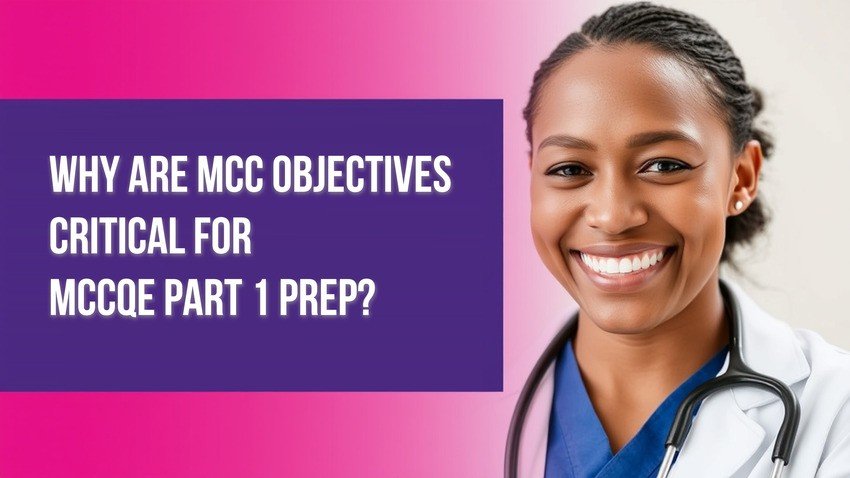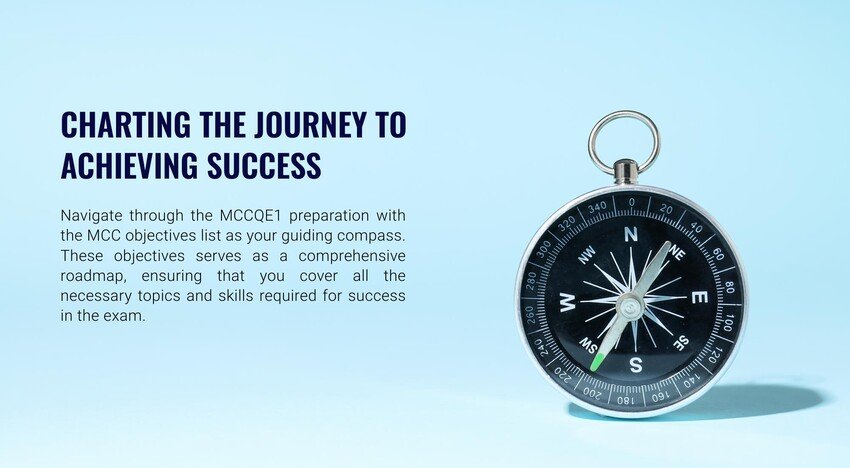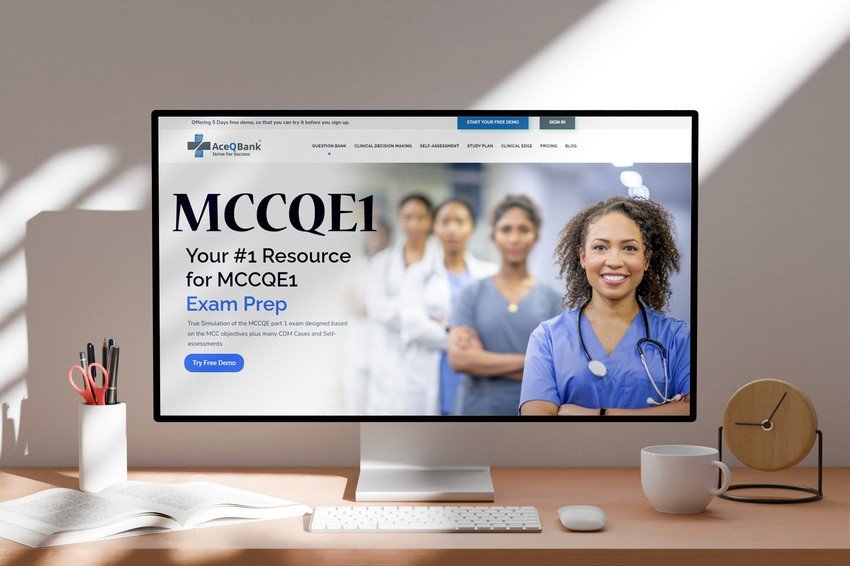MCC Objectives for MCCQE1 | Prep & Practice Questions

Many medical graduates gear up for the MCCQE1 exam every year. Without knowing what the backbone of this medical licensing exam is?
You have probably heard about the “MCC Objectives.” That extensive list outlines what the Medical Council of Canada expects you to know. But here’s the million-dollar question. Are these objectives really the key to acing the exam? or are they just another bureaucratic hurdle?
In this blog post, I will explain why you should care so much about these objectives. We explore why these specific objectives should demand such a central role in your prep strategy. I also introduced a Canadian question bank that is designed with the objectives at its core.
What Are the MCC Objectives and Why Should You Care?
The Medical Council of Canada (MCC) Objective List. It is a list of objectives that outlines the competencies required for medical practice in Canada. The MCC Objective List is used as a reference for the development of the MCCQE Part 1 exam.
The qualification exam that assesses the readiness of medical graduates for independent practice in Canada. The list is organized based on the CanMEDs framework into the following categories:
- Medical Expertise
- Communication Skills
- Professionalism
- Health Advocacy
- Scholarly Activities
- Collaboration
- Management of Health Care
- Personal and Professional Development
Each category is further divided into specific competencies that candidates are expected to demonstrate during the exam.
The MCC Objective List stands as a vital compass for our medical educators. Residency program directors and medical students across Canada. It ensures the curriculum and training programs remain aligned with the highest standards of medical practice in this country.
Just as medicine evolves. So too does the objective list. It undergoes regular updates. Responding dynamically to the latest shifts in Canadian medical practice.
This commitment guarantees that those entering our healthcare system. They are equipped with knowledge that is current and relevant.
In guiding tomorrow’s physicians. The Objective List doesn’t just set expectations. It shapes a future of excellence in care for all Canadians.
MCC Objectives and MCCQE1 Prep

The objective list has a rich history that plays an important role in shaping medical education and practice in Canada.
The list of objectives began as a way to standardize. What Canadian medical students should know before entering residency. Over time, these objectives have been refined and expanded to cover a broad range of clinical competencies.
They don’t just focus on medical knowledge. But also emphasize communication, ethical decision making and professional responsibility—skills that every doctor needs in day to day practice.
The Medical Council of Canada developed these objectives. They did so to make sure that medical graduates have the necessary knowledge. Medical knowledge to provide safe, effective and compassionate care to patients.
Today, these objectives form the foundation of the MCCQE1 exam. This exam is a key milestone for medical graduates in Canada. Testing not only your understanding of medical facts. But also your ability to apply them in real-life scenarios.
The objectives list guides both your study plan and your clinical reasoning during exam preparation. Knowing these objectives well. Means you’re better prepared to face the challenges of the test. And, more importantly, the challenges of patient care.
What makes the objectives especially powerful is their focus on a practical and patient-centred approach. They encourage you to think like a clinician. A clinician who balances evidence-based medicine with empathy and clear communication.
This approach reflects the reality of Canadian healthcare today—diverse, complex and deeply human.
As you prepare for the MCCQE1 exam. Remember this:
These objectives are far more than just items to check off a list. They are your compass. Guiding you toward becoming not only a competent Canadian physician. But one who stands tall with confidence in every clinical encounter.
Mastering these objectives means more than passing an exam. It means mastering the essential knowledge that proves you’re ready to meet the challenges of Canadian healthcare.
It gives you clarity and focus. Helping you organize your study time efficiently — cutting through the noise to what truly matters.
In short, the MCC objectives are your key to success.
Embrace them, live them, and let them shape your journey. Because when it comes to caring for Canadians. There’s no room for shortcuts.
Why Are the MCC Objectives Critical for MCCQE Part 1 Prep?

Have you ever wondered why some candidates ace the MCCQE1 on their first attempt. While others struggle despite months of preparation? The difference often comes down to one critical element – mastery of the objectives.
Let me be crystal clear about this. The objectives list isn’t just another topic list. The objectives are the fundamental blueprint that forms the backbone of the entire MCCQE1 exam.
Every single question you’ll face on exam day is deliberately crafted from these objectives. This isn’t speculation. It’s straight from the Medical Council of Canada’s own guidance.
Looking at results over the last ten years. One data point screams for attention. Individuals who rigorously center their preparation around the objectives consistently. Achieve better outcomes than their peers. This isn’t anecdotal; it’s a clear pattern.
But why? Why are the objectives so important for prep? Because clarity cuts through the noise. It all boils down to eliminating noise and maximizing impact. That means not just about putting in hours during preparation. You’ve got to put in the right kind of hours.
Medical graduates who treated the objectives as their north star didn’t just pass—they excelled. That is because these objectives outline the precise competencies and knowledge expected of Canadian physicians at the entry-to-practice level.

Each question you’ll face on the MCCQE1 finds its roots in these objectives. They act as the exam’s DNA.
Canada’s health care context is unique. Here, patient-centred care, ethical practice and collaboration in the health system. Just as critical as mastering pathophysiology and pharmacology.
The objective list was designed to reflect these Canadian priorities. So the exam tests you on much more than textbook facts.
To ensure every physician stepping into Canadian practice has not only robust medical knowledge. But can also reason clinically, communicate effectively and uphold ethics. Along with advocating for population health.
For example, the objectives don’t just ask, “Can you diagnose diabetes?” They require you to know when to screen, how to manage complications, how to approach comorbidities, and what interprofessional communication is needed to ensure optimal care. The granularity here is intentional. The MCC is not looking for walking encyclopedias, but for professionals ready for the realities of Canadian clinical practice.
They are medical graduates who often ask, “Can’t I just use USMLE resources?” I believe that, with all the explanations so far, the answer is quite clear.
While USMLE materials hold value for certain aspects of medical knowledge. Relying solely on them overlooks critical region-specific elements vital to your success. Canadian medical practice demands more than a broad understanding. It requires targeted preparation tailored to our healthcare system.
Nevertheless, many candidates—especially international medical graduates—underestimate the importance of studying directly from the objectives.
It’s surprising how little awareness there is around this fact. This may account for the heavy reliance on resources intended for the USMLE steps to pass the Canadian medical licensing exam.
This mismatch leads to nothing but frustration and disappointment. You may know everything about a certain condition. But if you haven’t approached it through the uniquely Canadian lens outlined in the objectives. You will miss vital points that the exam specifically targets.
Here’s where irony bites hard. Those who design and oversee these evaluations are fully aware of these grey areas. The ambiguous zones where clarity fades and nuances matter most. And rest assured—they focus rigorously on testing precisely those tricky areas.
What are the Key Differences Between MCCQE Part 1 and USMLE Steps?

Both are medical licensing exams. However, they differ significantly in structure and focus. Thus, when comparing them. It’s important to understand how each exam. Fits into the medical licensing process of its respective country. As well as their unique structures and content focuses.
Structure and Number of Exams
The USMLE consists of three separate exams. Taken at different stages of medical training. Step 1 tests foundational basic sciences. Usually, after the second year of medical school.
Step 2 CK – Clinical Knowledge (CK). It focuses on clinical sciences and patient care. Commonly taken in the fourth year. Step 3 evaluates clinical management and decision-making during residency.
In contrast, the MCCQE1 is a single comprehensive exam. That can be taken after medical school graduation or during the final year. Combining medical knowledge, clinical decision making and ethics. Along with professional responsibilities, in one test.
Healthcare System Focus
The USMLE steps are designed for licensure in the United States. Emphasizing the medical knowledge and ethics necessary. For safe practice within the U.S. healthcare system.
The MCCQE1 focuses on Canadian licensing requirements. It reflects Canada’s unique healthcare priorities. Priorities such as patient-centred care, ethical practice and population health advocacy.
This Canadian context means candidates must prepare specifically for how medicine is practiced in Canada.
Content and Exam Emphasis
USMLE Steps separate content by stage. Step 1 is heavily concentrated on basic sciences like anatomy and biochemistry. Step 2 CK covers clinical knowledge. Step 3 assesses independent clinical management.
On the other hand, the MCCQE1 integrates all these areas into one exam. But places significant importance on clinical decision making, ethics and professional responsibilities. Alongside medical knowledge.
The MCCQE1 objectives outline not just medical facts. But how to apply them within Canadian clinical practice.
Timing and Preparation Approach
The USMLE exams are spread across medical school and residency years. Allowing stepwise assessment of knowledge and skills.
The MCCQE1 is usually taken after graduation or near the end of training to ensure readiness for Canadian practice. Because of this timing, MCCQE1 preparation requires focusing intensely on the official objective list.
These objectives are critical because they detail exactly. What competencies are expected from physicians entering Canadian practice – far beyond broad medical knowledge.
USMLE vs MCCQE1 Comparison | ||
Exam | USMLE Steps | MCCQE Part 1 |
Number of Exams | Three separate exams | One comprehensive exam |
Geographic Focus | United States | Canada |
Content Focus | Step 1 Basic sciences Step 2 CK Clinical knowledge Step 3 Clinical management | Integrated medical knowledge, clinical decision making, ethics (clinical oriented) |
Timing | Spread over medical school and residency | After medical school graduation or final year |
Why does this matter for the exam preparation? Candidates often wonder if USMLE study materials alone can prepare them for the exam. While USMLE resources cover valuable medical knowledge. They do not address the Canadian-specific objectives that form the backbone of MCCQE1.
In other words, while both USMLE Steps and MCCQE Part 1 assess essential medical knowledge. Their differences in exam structure and content focus mean candidates must tailor their preparation accordingly.
For MCCQE1 exam success. Aligning your study plan with the objectives is critical to address the distinct elements embedded in Canadian medical practice.
What is the Common Mistake IMGs Make in MCCQE1 Exam Prep?

If you’re an International Medical Graduate (IMG). Preparing for the MCCQE Part 1. I want to speak to you directly. The biggest mistake many IMGs make is not using the MCC objectives as their central guide. Let me explain why this matters so much.
Many IMGs come from different medical education backgrounds. Often relying heavily on resources designed for the USMLE or other exams.
These materials are valuable. But they don’t capture the full picture of what the MCCQE Part 1 demands. It’s easy to fall into the trap of thinking. “If I know everything about diseases and treatments, I’ll be fine.”
But here’s the catch—this exam isn’t just about medical knowledge. Think of the objective list as the DNA of the exam.
The Medical Council of Canada crafts every question based on these objectives. They don’t want you to be a mere encyclopedia of facts. Instead, they want you to:
- Understand Canadian healthcare priorities
- Think clinically in ways relevant to Canadian practice
- Uphold ethical standards
- Advocate for population health
The objectives drill down into clinical reasoning, patient-centred care and teamwork. For example, it’s not enough to know how to diagnose diabetes. You must also know when to screen.
Ignoring these objectives means you’re likely spending hours. Studying the wrong material or missing key nuances critical for your success. You might ace questions about textbook facts. But stumble on those focused on ethical dilemmas, communication or system-based practice in Canada.
As a result, frustration builds up. You put in the work but don’t see the results. That’s not because you lack knowledge—it’s because you missed the target.
What Is the Most Effective Strategy for Mastering MCC Objectives?

Studying for the MCCQE1 exam. It isn’t just about absorbing vast amounts of medical knowledge. It’s about mastering a specific set of competencies – the MCC objectives.
Think of these objectives as the ultimate content strategy guide for your exam preparation. They define exactly what you need to know and be able to do. So, how do you ensure your study plan effectively targets this crucial content framework?
The answer lies in moving beyond passive review and embracing active, targeted practice. While textbooks and notes lay the groundwork, the most effective strategy centres on utilizing a high-quality question bank meticulously aligned with the objectives.
Mastering the objectives requires more than just familiarity; it demands application and recall under pressure. This is where a purpose-built question bank becomes indispensable. Consider Ace QBank, a resource designed with the objective list as its blueprint. Every single question is crafted not just to test knowledge, but to directly map back to these core competencies.
This deliberate alignment ensures your study time isn’t wasted on irrelevant tangents. You’re engaging directly with content. Content that is structured in the way the MCC expects you to understand and apply knowledge.
There is a huge difference between reading about a topic. And actively engage with questions to use the information in a relevant context.
The bottom line is that it is the most effective approach. Involves using a high-quality, objective-aligned question bank. One that acts as your interactive content guide, enabling active recall and targeted practice.
This way, you move from simply studying medicine. To actively master the competencies required for success on the MCCQE1.
Is Ace QBank Aligned with MCC Objectives?

When it comes to preparing for the MCCQE Part 1 exam. There are a few question banks out there. Each is promising to help you succeed.
But none come close to matching the precision and relevance of Ace QBank. I say this with absolute certainty. Ace QBank is the single most aligned resource with the Medical Council of Canada’s objectives.
To be blunt, studying for the MCCQE Part 1 without Ace QBank is a gamble you simply shouldn’t take. It’s not just another random collection of questions. It’s a carefully crafted tool designed from the ground up to mirror exactly what the exam expects you to know.
The Qbank doesn’t just prepare you for the exam—it prepares you for real world Canadian medical practice. Every question reflects Canadian guidelines and clinical realities.
You need a resource that doesn’t just test your knowledge. But trains your mind to think like a Canadian physician. To anticipate the kinds of decisions and clinical reasoning that the MCC expects.
This level of alignment means your study time becomes laser focused, efficient and incredibly effective.
Ace QBank delivers on this promise with precision and depth. It aligns seamlessly with the MCC objectives. Ensuring that your preparation is focused, relevant and effective. The questions are designed to mirror the exam’s style and complexity. Giving you the confidence to face the test head-on.
So, if you’re serious about passing the MCCQE1—and I know you are—make the Qbank a cornerstone of your study strategy. It’s more than just a question bank. It’s your partner in success.
Your guide through the intricacies of Canadian medical practice. And your key to unlocking the door to licensure.
What is the Best Ace Qbank Package for MCCQE1 exam Prep?

Choosing the right study package can make a significant difference in your success. Among the options offered by the Qbank. The premium package stands out as the best choice for comprehensive and effective preparation.
Let’s explore why this package is highly recommended for anyone serious about conquering the MCCQE1. Here is the overview:
- Full Access to Over 2800 High-Yield Questions
- Detailed Evidence-Based Explanations
- Unlimited Use of Both Study Modes
- Two Self-Assessments Included
- Flowcharts, Summary Tables and Illustrations
- Cost Effective
The Premium Package provides full access to over 2800 high-yield questions. Questions that cover all the essential areas tested by the Medical Council of Canada.
The best part is that you will have unlimited access. Having unlimited access means you can practice widely. Ensure you build a strong foundation across all subjects that appear on the exam.
One of the key strengths of the Premium Package is its inclusion of both study modes—Time Mode and Tutor Mode.
Time Mode simulates real exam conditions. Helping you develop crucial time management skills needed to complete the exam within the allotted period. Meanwhile, Tutor Mode offers detailed explanations and allows you to focus on topics where you might face challenges.
This dual approach ensures your study sessions are not only thorough. But also tailored to your specific learning needs.
In addition to the question bank itself. The Premium Package includes two self-assessments designed by medical experts. These assessments feature challenging questions not found in the main bank.
Providing an excellent opportunity to evaluate your readiness before exam day. This feature helps you identify weak areas early enough to adjust your study plan. And improve your chances of success.
Visual aids play an important role in helping candidates retain complex information. The Premium Package grants access to all flowcharts, summary tables and custom illustrations. These resources simplify complicated medical concepts. And make it easier to remember critical points. For many students, these visual tools act as mental anchors that enhance recall during the stress of exam day.

Another standout aspect is its commitment to evidence-based medicine through detailed explanations accompanying every question. Instead of simply telling you the correct answer. These explanations help you understand the reasoning behind it.
This deeper level of learning promotes critical thinking and strengthens your clinical reasoning skills—abilities that are essential both for passing the exam and for future practice.
Ultimately, choosing the Premium package is more than just getting a discount. It’s about smart preparation that respects both your budget and your precious time. It’s an investment in your future that pays off with confidence and success on exam day.
Despite all the explanations laid out so far. I’m sure some of you might be wondering. Is investing in the Premium Package really worth it? The answer is a resounding yes.
If you’re searching for a study resource that leaves no stone unturned, one that combines comprehensive content coverage with detailed feedback and self-assessments, plus invaluable visual aids — then the Premium Package from Ace QBank is your best bet.
It equips you with everything you need to face your exam confidently and competently. No shortcuts, just solid preparation.
Does Ace QBank Offer Free MCCQE Part 1 Sample Questions?

You might be wondering – Does Ace QBank offer free MCCQE Part 1 Sample Questions? The short answer is yes. But with a small step involved.
To get access to these sample questions. You’ll need to sign up for a free demo account. This isn’t just about unlocking questions.
It’s your chance to explore the entire Qbank interface. I believe this hands-on exploration can make a huge difference.
Once you’re in, you can test key features like flagging questions for review and highlighting important details — tools that can really streamline your study sessions. You’ll also be able to create question blocks and choose from different study modes.
Just like during your real exam practice. This gives you a realistic feel for how the platform supports your learning.
Why is this important? Taking advantage of free MCCQE Part 1 sample questions is more than just a freebie. It’s a strategic move that lets you dip your toes in the water before committing. By trying the platform and answering these questions firsthand. You’ll quickly find out if Ace QBank fits your learning style and meets your preparation needs.
So, take that first step. Sign up for the free demo. Explore. Try the questions. And see if this question bank becomes your trusted study companion. On your path to becoming a licensed physician in Canada.
Key Takeaways
MCC Objectives Are Crucial. The Medical Council of Canada’s Objectives form the foundation of the exam and outline the competencies expected from physicians entering Canadian practice. Candidates focusing on these objectives perform better on the MCCQE Part 1.
Canadian-Specific Content Matters. Unlike USMLE resources, which focus on U.S. medical practice, the Objective list requires preparation tailored to Canadian clinical realities and healthcare priorities.
Common Mistakes IMGs Make. Many International Medical Graduates rely heavily on USMLE materials. And overlook the importance of the objectives. Which can lead to missing key exam elements and lower performance.
Ace QBank Premium Package Benefits. The premium package offers over 2800 questions. Detailed explanations, self-assessments and visual aids—making it a comprehensive and cost-effective tool for MCCQE1 success.



